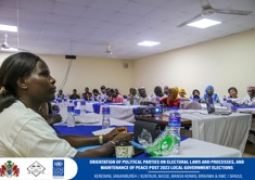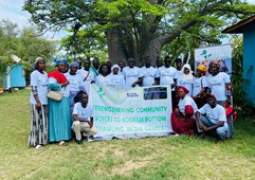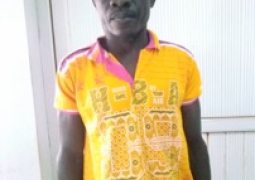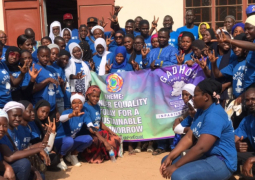The event dubbed 'Walk for Health', was held on the theme 'creating awareness on the harmful effects of drugs abuse' through walk exercise under the motto "One for all and all for one'.
The walk that is regular in their exercise, started to and from Serrekunda East Mini Stadium to Westfield.
Amadou Bayo, founder of Bayo Fitness explained that the sporting outfit was founded in 2014, adding that since formation, it had participated in many sporting competitions.
He disclosed that he was an athlete, a volleyball player, a handball player, a footballer, and many other sports. “I did some coaching courses on sports and I know how to help people lose weight and gain strength. I founded Bayo Fitness and using it as a gateway to help people to be healthy.”
He indicated that their ‘Walk for Health’ has improved the health condition of many people.
“At first, we had people joining us with different kinds of illness like hypertension and diabetes, but it has really impacted their health now.”
Bayo thus advised that before employing a family doctor, people should employ a family trainer.
“Relaxing and eating fatty foods can bring you some health complications in the end. People used to associate hypertension with old people but nowadays, young people are even affected due to lack of exercise.”
On training method, he said walking is first and is last with many health benefits, while acknowledging that walking can reduce all death-related diseases to 40%.
“Walking is the only exercise that engages your whole body. People live in different conditions at home and some are stressed, but when they join the group for training, it helps change their mood.”
Abdou Aziz Gaye, a trainee said the problem in the Gambia is the mis-contextualisation of what walk for health is all about. He explained that people invest more in treatment than prevention, which he said, is causing a great problem to ‘our economy’.
“Government is spending more money in building hospitals infrastructure with medications and doctors. It’s important but the pressure can also be reduced in our hospitals if we prevent ourselves from having diseases.”
Gaye noted that the training can prevent people from many diseases, saying they have seen people who were not able to walk for some meters before joining the group but now have improve a lot.
“Our institutions invest more on health insurance, but its time they hire trainers instead. Sitting home without training has many negative consequences.”
Mariama Sanneh, a member of the group expressed similar sentiments.
She revealed that she used to sit at home as a housewife, where she developed hypertension.
“I went to the hospital and they advised me to do some exercise. The training has impacted a lot on me and I have even stopped taking my medications now.”
She urged all to adopt regular training, adding that it can reduce depression and mental illnesses.





